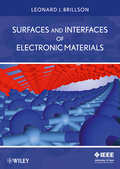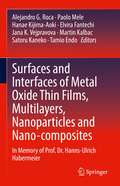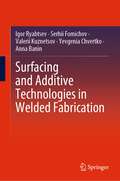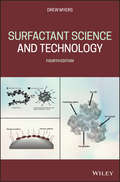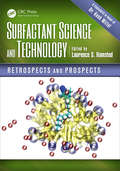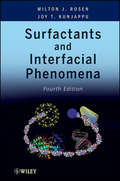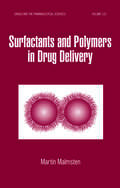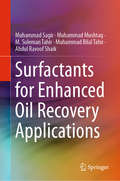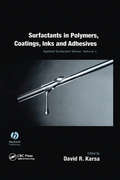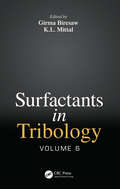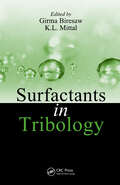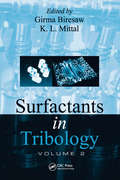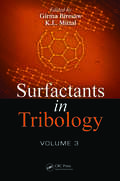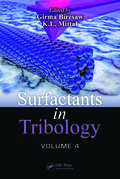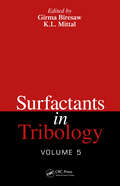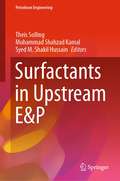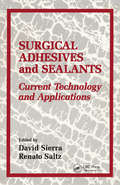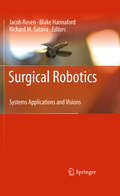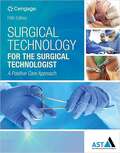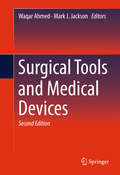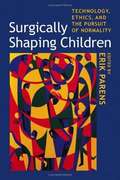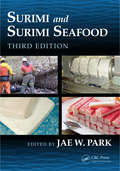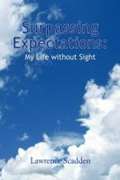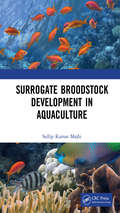- Table View
- List View
Surfaces and Interfaces of Electronic Materials (Wiley - IEEE #7)
by Leonard J. BrillsonAn advanced level textbook covering geometric, chemical, and electronic structure of electronic materials, and their applications to devices based on semiconductor surfaces, metal-semiconductor interfaces, and semiconductor heterojunctions. Starting with the fundamentals of electrical measurements on semiconductor interfaces, it then describes the importance of controlling macroscopic electrical properties by atomic-scale techniques. Subsequent chapters present the wide range of surface and interface techniques available to characterize electronic, optical, chemical, and structural properties of electronic materials, including semiconductors, insulators, nanostructures, and organics. The essential physics and chemistry underlying each technique is described in sufficient depth with references to the most authoritative sources for more exhaustive discussions, while numerous examples are provided throughout to illustrate the applications of each technique. With its general reading lists, extensive citations to the text, and problem sets appended to all chapters, this is ideal for students of electrical engineering, physics and materials science. It equally serves as a reference for physicists, material science and electrical and electronic engineers involved in surface and interface science, semiconductor processing, and device modeling and design. This is a coproduction of Wiley and IEEE* Free solutions manual available for lecturers at www.wiley-vch.de/supplements/
Surfaces and Interfaces of Metal Oxide Thin Films, Multilayers, Nanoparticles and Nano-composites: In Memory of Prof. Dr. Hanns-Ulrich Habermeier
by Paolo Mele Tamio Endo Satoru Kaneko Alejandro G. Roca Hanae Kijima-Aoki Elvira Fantechi Jana K. Vejpravova Martin KalbacThis book provides a general overview and current state of the art of different types of metal oxide nanomaterials, either in nanoparticles or thin film structure. It covers from the development and optimization of different nanofabrication/synthesis techniques for nanostructures which are currently the attention of the research community, the study of the structure and interactions by different characterization techniques of heterostructured materials and the final impact in different applications such as nanotherapy, data storage, super magnets, high-frequency devices. The book’s 13 chapters provide deep insight into the intriguing science of oxide materials and include contributions on novel technologies to fabricate nanomaterials with a broad range of functional properties (semiconducting, magnetic, ferroelectric, thermoelectric, optical, flexible and mechanical). This book is intended to the experts for consolidation of their knowledge but also for students who aim to learn and get basics of nanostructured metal oxides in diverse forms.
Surfacing and Additive Technologies in Welded Fabrication
by Igor Ryabtsev Serhii Fomichov Valerii Kuznetsov Yevgenia Chvertko Anna BaninThis book provides a comprehensive overview of a wide range of surfacing methods, detailing their physical basics and technologies. Each section of the book provides information on the formation of the structure and properties of the deposited metal, the reasons for the formation of defects, and directions for prevention. The book also covers the certification of surfacing procedures, adhering to international standards. With a focus on practical applications, the book is an essential reference for anyone working in the field of welding and related technologies. It includes detailed illustrations and diagrams, making it easy to understand and follow the concepts.
Surfactant Science and Technology
by Drew MyersA solid introduction to the field of surfactant science, this new edition provides updated information about surfactant uses, structures, and preparation, as well as seven new chapters expanding on technology applications. Offers a comprehensive introduction and reference of the science and technology of surface active materials Elaborates, more fully than prior editions, aspects of surfactant crystal structure as well as their effects on applications Adds more information on new classes and applications of natural surfactants in light of environmental consequences of surfactant use
Surfactant Science and Technology: Retrospects and Prospects
by Laurence S. RomstedSurfactant research explores the forces responsible for surfactant assembly and the critical industrial, medical, and personal applications, including viscosity control, microelectronics, drug stabilization, drug delivery, cosmetics, enhanced oil recovery, and foods. Surfactant Science and Technology: Retrospects and Prospects, "a Festschrift in ho
Surfactants and Interfacial Phenomena
by Milton J. Rosen Joy T. KunjappuNow in its fourth edition, Surfactants and Interfacial Phenomena explains why and how surfactants operate in interfacial processes (such as foaming, wetting, emulsion formation and detergency), and shows the correlations between a surfactant's chemical structure and its action. Updated and revised to include more modern information, along with additional three chapters on Surfactants in Biology and Biotechnology, Nanotechnology and Surfactants, and Molecular Modeling with Surfactant Systems, this is the premier text on the properties and applications of surfactants. This book provides an easy-to-read, user-friendly resource for industrial chemists and a text for classroom use, and is an unparalleled tool for understanding and applying the latest information on surfactants. Problems are included at the end of each chapter to enhance the reader's understanding, along with many tables of data that are not compiled elsewhere. Only the minimum mathematics is used in the explanation of topics to make it easy-to-understand and very user friendly.
Surfactants and Polymers in Drug Delivery (Drugs and the Pharmaceutical Sciences)
by Martin MalmstenThis reference features the latest findings surrounding the physicochemical aspects of surfactant and polymer systems to facilitate the design and understanding of novel and advanced drug delivery formulations. It covers the basics of surfactant and polymer surface activity and self-assembly, the various types of structures formed by such compounds
Surfactants for Enhanced Oil Recovery Applications
by Muhammad Sagir Muhammad Mushtaq M. Suleman Tahir Muhammad Bilal Tahir Abdul Ravoof ShaikThis book provides a concise treatise on the use of surfactants in enhanced oil recovery (EOR), including information on key types of surfactants and their respective applications in the wider petroleum industry. The authors discuss carbon dioxide EOR, alkaline-surfactant-polymer flooding strategies, and the use of surfactants as a means of reducing interfacial tension, while also paying special attention to the challenges involved in using surfactants for enhanced oil recovery, such as the difficult issue of surfactant adsorption on reservoir rock. All chapters highlight and are based on the authors’ own laboratory-scale case studies. Given its content, the book offers a valuable asset for graduate students of petroleum and chemical engineering, as well as researchers in the field of chemical enhanced oil recovery. It will also be of interest to professionals involved in enhanced industrial oil recovery.
Surfactants in Polymers, Coatings, Inks, and Adhesives
by David R. KarsaSurface active agents are used as process aids in the production of polymers--as additives to impart or modify polymer properties--and in the formulation and further processing of polymeric systems for a variety of applications. In all these uses, the surfactants are used as 'effect chemicals,' to impart specific performance characteristics or properties to the base polymer or to enhance it performance when formulated for a specific end use.This volume focuses on those surfactant areas incorporating the greatest number of supplier and user companies. Authors have been selected from leading industrial and academic laboratories around the world. It provides an introduction to the underlying chemistry and technology in these industrial areas, and at the same time, highlights important recent developments.Surfactants in Polymers, Coatings, Inks and Adhesives is a book for surfactant researchers and for manufacturers and users of surfactants. In particular, surfactant chemists, analytical chemists, environmental chemists, users of surfactant formulations in the fields of specialty chemicals, polymers, and detergents, and health and safety personnel.
Surfactants in Tribology
by K. L. Mittal Girma BiresawSurfactants play a critical role in Tribology controlling friction, wear, and lubricant properties such as emulsification, demulsification, bioresistance, oxidation resistance, rust prevention and corrosion resistance. This is a critical topic for new materials and devices particularly those built at the nanoscale. This newest volume will address important advances, methods, and the use of novel materials to reduce friction and wear. Scientists from industrial research and development (R&D) organizations and academic research teams in Asia, Europe, the Middle East and North America will participate in the work.
Surfactants in Tribology, Volume 1
by K. L. Mittal Girma BiresawSurfactants play a variety of critical roles in tribology. In addition to controlling friction and wear, they also allow for control of a wide range of properties of lubricants, such as emulsification/demulsification, bioresistance, oxidation resistance, and rust/corrosion prevention. This book explains recent advances in the role of surfactants wi
Surfactants in Tribology, Volume 2
by K. L. Mittal Girma BiresawThe premier symposium on Surfactants in Tribology, held in Seoul in 2006, was an enormously successful event that generated a high level of interest in the topic, leading to the publication of the first volume in this series in 2008. The tremendous response was echoed at the follow-up symposium in Berlin that same year, and leading researchers, man
Surfactants in Tribology, Volume 3
by Girma Biresaw Kashmiri Lal MittalThe manufacture and use of almost every consumer and industrial product rely on application of advanced knowledge in surface science and tribology. These two disciplines are of critical importance in major economic sectors, such as mining, agriculture, manufacturing (including metals, plastics, wood, computers, MEMS, NEMS, appliances), construction
Surfactants in Tribology, Volume 4
by K. L. Mittal Girma BiresawSurface science and tribology play very critical roles in many industries. Manufacture and use of almost all consumer and industrial products rely on the application of advanced surface and tribological knowledge. The fourth in a series, Surfactants in Tribology, Volume 4 provides an update on research and development activities connecting surfacta
Surfactants in Tribology, Volume 5
by K. L. Mittal Girma BiresawSurfactants play a critical role in Tribology controlling friction, wear, and lubricant properties such as emulsification, demulsification, bioresistance, oxidation resistance, rust prevention and corrosion resistance. This is a critical topic for new materials and devices particularly those built at the nanoscale. This newest volume will address tribological properties of cutting fluids, lubricant performance related to steel surfaces, biolubricants, and novel materials and ways to reduce friction and wear. Scientists from industrial research and development (R&D) organizations and academic research teams in Asia, Europe, the Middle East and North America will participate in the work.
Surfactants in Upstream E&P (Petroleum Engineering)
by Theis Solling Muhammad Shahzad Kamal Syed M. Shakil HussainThis edited book explores the use of surfactants in upstream exploration and production (E&P). It provides a molecular, mechanistic and application-based approach to the topic, utilising contributions from the leading researchers in the field of organic surfactant chemistry and surfactant chemistry for upstream E&P. The book covers a wide range of problems in enhanced oil recovery and surfactant chemistry which have a large importance in drilling, fracking, hydrate inhibition and conformance. It begins by discussing the fundamentals of surfactants and their synthesis. It then moves on to present their applicability to a variety of situations such as gas injections, shale swelling inhibition, and acid stimulation. This book presents research in an evolving field, making it interesting to academics, postgraduate students, and experts within the field of oil and gas.
Surgical Adhesives & Sealants: urrent Technology and Applications
by David H. SierraSurgical tissue adhesives are an ancient idea, going back to the beginnings of recorded history. The concept of adhering, rather than suturing, packing, or stapling planes of tissue is attractive, in that it is fast-acting and assures complete closure. Numerous technologies have been tried; some with limited success, others outright failures. In short, the perfect adhesive does not exist. Limitations occur in a number of areas: strength, toxicity, degradation, and safety. It is also important to keep in mind that "one size fits all" does not apply to adhesives in surgical applications any more than it does in day-to-day application. As one would not use paper glue to seal a bathtub, one would presumably not apply an adhesive onto tendons, which is suitable for sealing corneas. The properties required of an adhesive for each indication are quite different. Over the last twenty-five years, advances have been made in a wide range of technologies targeting some embodiment of a practical and safe adhesive. Foremost and successful among these are cyanoacrylates, marine adhesive proteins, and fibrin-based sealants. Another promising adhesive technology is laser solders, a mixture of polypeptides and proteoglycans, which integrates with the repair site when laser energy is applied. In light of these advances in the field, the Symposium for Surgical Tissue Adhesives was organized and held at the Atlanta Hyatt from October 8-10, 1993. The goal was to bring together these far-flung technologies in a comprehensive and cohesive manner. Presentations by investigators from around the world described the history of adhesives in medicine, current technologies, laboratory characterizations, and application developments, as well as regulatory aspects and clinical applications. We felt that as many viewpoints as possible, however conflicting, were important to present in order to give the most complete picture of the state of the art of surgical adhesives.
Surgical Robotics
by Blake Hannaford Richard M. Satava Jacob RosenSurgical robotics is a rapidly evolving field. With roots in academic research, surgical robotic systems are now clinically used across a wide spectrum of surgical procedures. Surgical Robotics: Systems Applications and Visions provides a comprehensive view of the field both from the research and clinical perspectives. This volume takes a look at surgical robotics from four different perspectives, addressing vision, systems, engineering development and clinical applications of these technologies. The book also: -Discusses specific surgical applications of robotics that have already been deployed in operating rooms -Covers specific engineering breakthroughs that have occurred in surgical robotics -Details surgical robotic applications in specific disciplines of surgery including orthopedics, urology, cardiac surgery, neurosurgery, ophthalmology, pediatric surgery and general surgery Surgical Robotics: Systems Applications and Visions is an ideal volume for researchers and engineers working in biomedical engineering.
Surgical Technology for the Surgical Technologist: A Positive Care Approach
by Inc. Kevin B. Frey Association of Surgical TechnologistsPacked with detailed, full-color illustrations and live surgery images, market-leading SURGICAL TECHNOLOGY FOR THE SURGICAL TECHNOLOGIST: A POSITIVE CARE APPROACH, 5e, delivers the most up-to-date and comprehensive coverage of over 200 essential surgical procedures. <p><p>It also includes essential topics such as equipment and supplies, operative preparation, practical and technical considerations, and postoperative considerations. "Pearls of Wisdom" features offer practical insight from surgical technologists in the field, and numerous learning resources help you maximize your course success -- including "A POSITIVE CARE" memory tool, real-life case studies with critical thinking questions, and the powerful digital learning solution MindTap. <p><p>Preparing you for real-world practice, SURGICAL TECHNOLOGY FOR THE SURGICAL TECHNOLOGIST, 5e, is the ultimate resource for helping you anticipate the patient's and surgeon's needs before, during, and after a surgical procedure.
Surgical Tools and Medical Devices
by Mark J. Jackson Waqar AhmedThis new edition presents information and knowledge on the field of biomedical devices and surgical tools. The authors look at the interactions between nanotechnology, nanomaterials, design, modeling, and tools for surgical and dental applications, as well as how nanostructured surfaces can be created for the purposes of improving cell adhesion between medical devices and the human body. Each original chapter is revised in this second edition and describes developments in coatings for heart valves, stents, hip and knee joints, cardiovascular devices, orthodontic applications, and regenerative materials such as bone substitutes. There are also 8 new chapters that address:Microvascular anastomosesInhaler devices used for pulmonary delivery of medical aerosolsSurface modification of interference screwsBiomechanics of the mandible (a detailed case study)Safety and medical devicesThe synthesis of nanostructured materialDelivery of anticancer molecules using carbon nanotubesNano and micro coatings for medical devicesThis book is appropriate for engineers, material scientists, chemists, physicists, biologists, medical and dental professionals with an interest in biomedical devices and tools, and researchers in the same fields.
Surgically Shaping Children: Technology, Ethics, and the Pursuit of Normality
by Erik ParensAt a time when medical technologies make it ever easier to enhance our minds and bodies, a debate has arisen about whether such efforts promote a process of "normalization," which makes it ever harder to tolerate the natural anatomical differences among us. The debate becomes especially complicated when it addresses the surgical alteration, or "shaping," of children. This volume explores the ethical and social issues raised by the recent proliferation of surgeries designed to make children born with physical differences look more normal. Using three cases—surgeries to eliminate craniofacial abnormalities such as cleft lip and palate, surgeries to correct ambiguous genitalia, and surgeries to lengthen the limbs of children born with dwarfism—the contributors consider the tensions parents experience when making such life-altering decisions on behalf of or with their children. The essays in this volume offer in-depth examinations of the significance and limits of surgical alteration through personal narratives, theoretical reflections, and concrete suggestions about how to improve the decision-making process. Written from the perspectives of affected children and their parents, health care providers, and leading scholars in philosophy, sociology, history, law, and medicine, this collection provides an integrated and comprehensive foundation from which to consider a complex and controversial issue. It takes the reader on a journey from reflections on the particulars of current medical practices to reflections on one of the deepest and most complex of human desires: the desire for normality.
Surimi and Surimi Seafood
by Jae W. ParkOriginating in Japan in the twelfth century, surimi is refined fish myofibrillar proteins produced through various processes. The development of the surimi product crabstick in Japan in the 1970s played a major role in globalizing surimi and expanding surimi seafood consumption to the United States, Europe, and Russia. Commercial surimi production
Surpassing Expectations: My Life without Sight
by Lawrence ScaddenThe booktells the story of the author's life without sight,a memoir that recalls the activities that brought him international acclaim as a scientist, policymaker, and advocate.
Surrogate Broodstock Development in Aquaculture
by Sullip Kumar MajhiThe rapidly changing climatic condition coupled with habitat destruction, aquatic pollution and increasing anthropogenic pressure on water bodies have resulted in decline of many important fish population and some of them even become endangered. As of now the breeding protocol for seed production in captivity is developed for only handful of fish species and mostly their seed is collected from natural resources for aquaculture. This factor limits the efforts for species diversification in aquaculture. There are approaches/ technologies to generate seed of such fish species for aquaculture, especially the species that are too large to propagate in captivity or species those do not response to hormonal treatments due to stress of confinement. One of the viable approach is surrogate broodstock development using adult fish as the recipient. The obvious advantage of using adult fish as recipient is that, the donor-derived gametes can be generated within few months after stem cell transplantation; oppose to using embryos or young hatchlings those take years together to attain sexual maturity. Note: T& F does not sell or distribute the Hardback in India, Pakistan, Nepal, Bhutan, Bangladesh and Sri Lanka.
